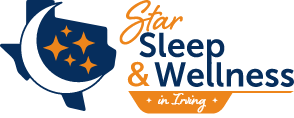
Do you enjoy a nightcap before bed? Many people like to wind down after a hard day at work with a glass of their favorite wine or spirit. While this isn’t necessarily a bad thing to engage in now and then, daily consumption can become problematic, especially when an individual believes it will help them achieve better rest. The truth is for those living with sleep apnea, this nightly occurrence can lead to more frequent interruptions because of a person’s inability to breathe. Keep reading to discover why alcohol and sleep apnea do not mix well together.
Alcohol and Its Effect on Sleep
Alcohol affects people differently; however, for many, it can often induce drowsiness. As a result, there is a common misconception that it leads to a more restful night’s sleep. This repeated myth can be detrimental if you are living with sleep apnea. Here’s why:
Whether it’s a glass of wine, your favorite hard liquor, or a beer you prefer to enjoy, alcohol can cause mouth and throat muscles to relax, which means they can fall back onto the airway and create an obstruction. But this is not the only potential problem that can occur. Alcohol consumption can also:
- Lower oxygen levels
- Make it harder to wake up when faced with an airway obstruction
- Cause nasal congestion, which leads to mouth breathing
- Heighten one’s blood alcohol level and increase the chances of experiencing OSA (obstructive sleep apnea)
- Increase the potential for cardiovascular problems, many of which are associated with OSA (i.e., heart attack, stroke, etc.)
Ways to Address Sleep Apnea
While the best solution is to simply avoid alcohol before bedtime, it’s imperative for you to seek help from an expert who can provide sleep apnea treatment. This will address the bigger problem of your inability to breathe freely while asleep.
Although they may suggest various lifestyle changes, including the reduction or avoidance of alcohol (specifically before bedtime), they will also be able to provide a more clinical approach in the form of CPAP therapy or a custom-made oral appliance.
Continuous positive airway pressure (CPAP) is the primary form of treatment for sleep apnea sufferers; however, many individuals struggle with the bulky machinery and noise caused by the air being pushed out and into the mask.
Oral appliances, however, offer a more user-friendly and portable approach. Designed to fit each person’s mouth comfortably, these devices require no tubes, masks, or machines. They’re worn inside the mouth and keep the airway open by pushing the jaw slightly forward. This less invasive option allows patients to get better rest each night and avoid obstructions that would otherwise cause breathing interruptions.
Get the root of the issue by talking to a local expert about sleep apnea treatment. Doing so will not only help you establish healthier lifestyle habits but also improve your sleep and breathing patterns for life.
About the Practice
Star Sleep & Wellness in Irving consists of several experts and specialists who understand the struggles of those who experience chronic fatigue brought on by sleep apnea. While treating the issue is their primary focus, debunking myths and providing clear, concise information is just as important. When a patient divulges their nightly practice of enjoying a nightcap before bed, our team is here to go over why this can contribute to worsening sleep as well as what can be done to fix it. Let us explain why OSA and alcohol shouldn’t mix by contacting us today.
